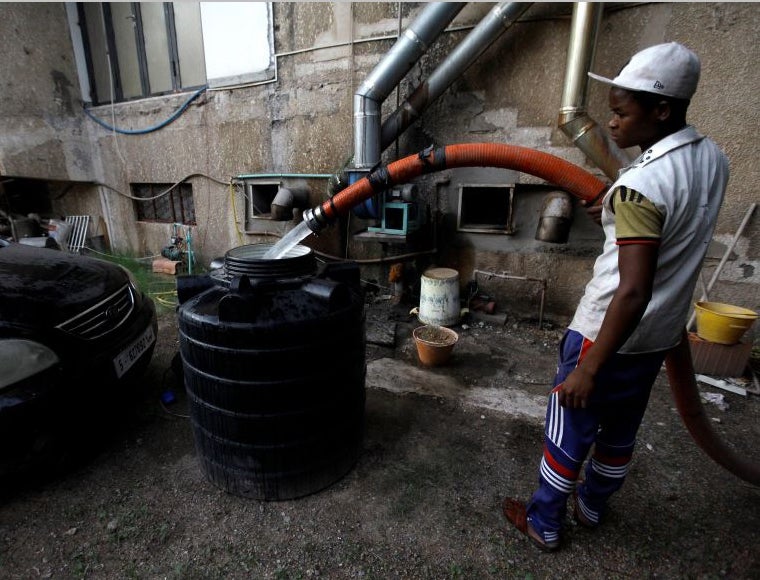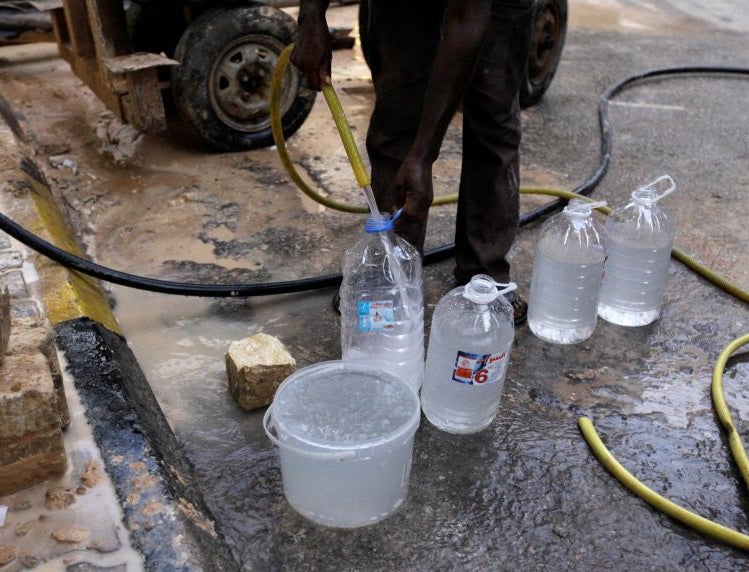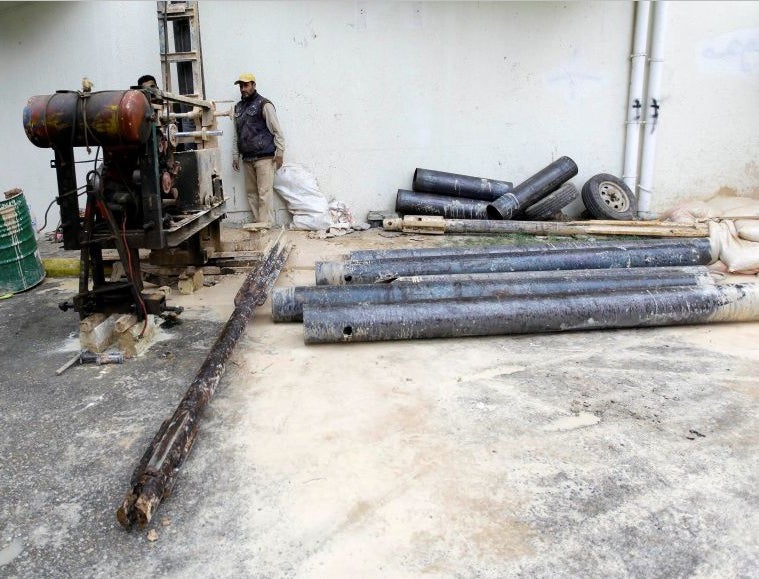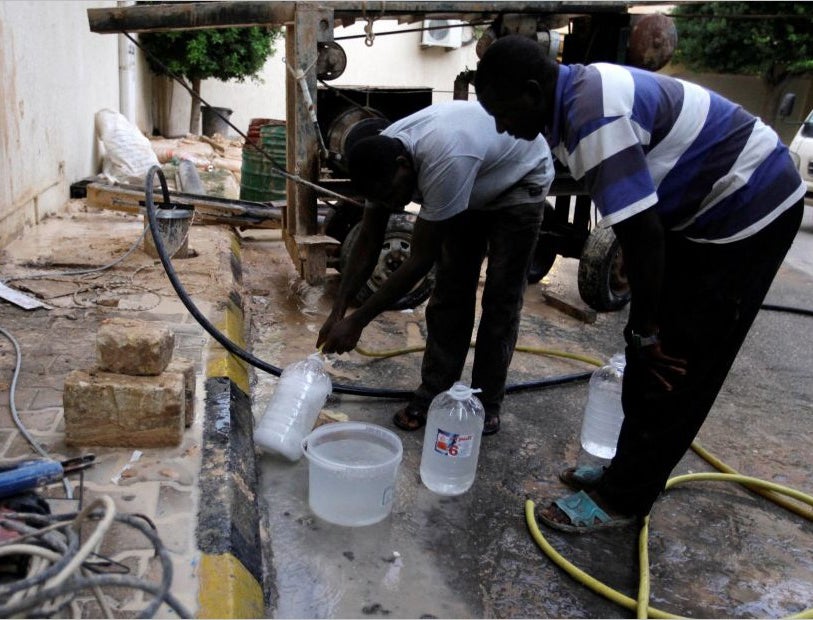Libya: Residents in Tripoli drill through pavements in desperate bid to find water
Workers turned off the mains to do urgent maintenance — then an armed group sabotaged the system

Your support helps us to tell the story
From reproductive rights to climate change to Big Tech, The Independent is on the ground when the story is developing. Whether it's investigating the financials of Elon Musk's pro-Trump PAC or producing our latest documentary, 'The A Word', which shines a light on the American women fighting for reproductive rights, we know how important it is to parse out the facts from the messaging.
At such a critical moment in US history, we need reporters on the ground. Your donation allows us to keep sending journalists to speak to both sides of the story.
The Independent is trusted by Americans across the entire political spectrum. And unlike many other quality news outlets, we choose not to lock Americans out of our reporting and analysis with paywalls. We believe quality journalism should be available to everyone, paid for by those who can afford it.
Your support makes all the difference.Across Libya's capital residents have started drilling through pavements to access wells in a desperate search for water after the taps ran dry in a new low for living conditions.
After years of neglect, workers turned off the water to do urgent maintenance earlier this month, cutting supplies to many Tripoli households. Then an armed group sabotaged the system, prolonging the misery.
The water crisis is a powerful symbol of state failure in a country that was once one of the wealthiest in the Middle East but has been gripped by turmoil since a 2011 uprising unseated Muammar Gaddafi.
For Libyans the chaos has meant power cuts and crippling cash shortages. These are often made worse by battles between armed groups vying for control of the fractured oil-rich state and its poorly-maintained infrastructure.
“We haven't had water for ten days. The state does nothing,” said Nasser Said, a landlord in Tripoli's upmarket Ben Ashour district.
Already equipped with a generator to keep the power running during outages that sometimes last more than a day, he hired drillers to dig some 31 meters to extract groundwater for the six apartments in the residential block he owns.
“No water, no electricity. You become a state in a state,” he said, standing next to his building on a leafy side street. “We last had to do this maybe 20 years ago.”
Like many Libyans, Said is sceptical about the chances of U.N.-led peace talks unifying rival factions that have been fighting for control.

The talks were adjourned last week with little sign of progress in creating a government that could stabilise Libya and stand up to armed groups that have repeatedly seized oil facilities and other state assets to make demands.
The U.N.-supported Government of National Accord (GNA) has struggled to impose its authority since its leaders arrived in Tripoli in March last year.
Early last week an armed faction in the south said it had turned off water supplies from Gaddafi's Great Man Made River, a pipeline system that pumps water from underneath Libya's vast southern desert to coastal areas such as Tripoli.
The group is seeking the release of a leader imprisoned by a rival faction in the capital, said Tawfiq Shwehaidi, a manager at the Great Man Made River based in the eastern city of Benghazi.
“We had started maintenance work on the 16th (of October) and cut supplies to Tripoli,” he said.
“Afterwards an armed group... set one power plant on fire which closed three other plants and shut down 24 wells.”

That has deprived residents of water while boosting the business of drillers who for 4,000-6,000 Libyan dinars ($2,940-$4,410 at the official exchange rate) access groundwater unused in some neighbourhoods since the Great Man Made River started pumping water to Tripoli in 1996.
“We drill about three wells in two weeks — it takes about three to four days to drill a well,” said Abdulsalam Forganea, a 23-year-old worker helping to operate an ageing drilling rig.
Parts of Tripoli offer a semblance of normality and power cuts have eased since the summer.
The city has seen fewer big clashes since a handful of armed groups aligned with the GNA earlier this year.
But security is still fragile. A former prime minister was abducted in August for nine days by one of the two most powerful armed groups, while the other engaged in a battle this month that shut down the airport.

A Reuters reporter recently saw a traffic clogged commercial street suddenly empty as a man was fatally shot by militiamen. Kidnapping for ransom is rife.
A conflict that escalated in 2014 has put extra pressure on a Tripoli population that swelled to an estimated three million with the arrival of displaced families from other Libyan cities.
Public health services are failing, inflation has spiralled, and the start of the school year has been delayed by several weeks because teachers are striking over salaries.
Shutdowns crippled oil revenues so little has been spent on repairs and maintenance, and the water network and other infrastructure have been corroded.
Most government spending goes on public salaries, including for former rebel groups that forced their way onto the state payroll after Gaddafi's overthrow.
“No budget has been transferred... since 2011 except the emergency budget, which is the result of the financial difficulties experienced by the Libyan state,” said Naji Assaed, head of the Libyan Water Authority.
Production at desalination plants has fallen sharply, with output at a plant in the western town of Zuwara dropping from 80,000 cubic litres to 16,000 cl annually.
Assaed said officials were working hard to resolve the crisis, but it was not clear when supplies would be restored. As he spoke a tanker arrived up to deliver water for his tattered ministry building.
“In the absence of adequate spare parts, lack of budgets, lack of stability in the security situation, security chaos, people do not comply with the law and all this has affected the performance of the system,” he said.
Reuters
Join our commenting forum
Join thought-provoking conversations, follow other Independent readers and see their replies
Comments